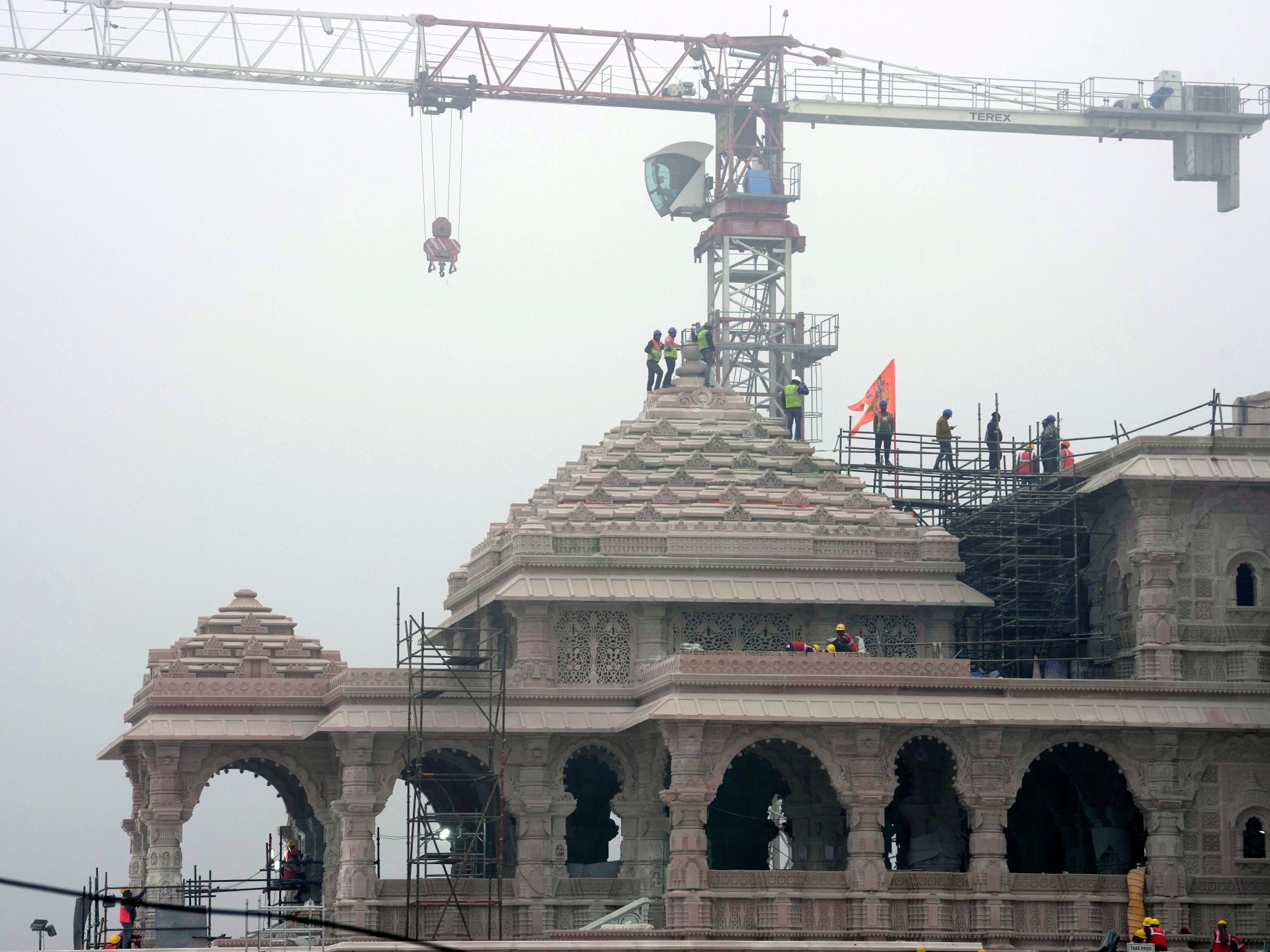
Ayodhya, India – For hundreds of years, for many Hindu pilgrims, a trip to Ayodhya meant a walk through narrow streets to the Hanuman Garhi Mandir, a temple honoring the monkey god Hanuman. Now a wide road leads to the shrine, with shops on either side selling sweets as offerings to the deity. Hanuman Garhi has a sombre dark dome and the temple has been repainted in red and saffron. His young priests are lively and agile.
But the 10th-century temple in the northern state of Uttar Pradesh is no longer the main attraction here. About 500 meters (547 yards) away, a brand new, unfinished structure has caught India’s attention.
Long lines of young men and women chant “Jai Shri Ram” (victory to Lord Ram) as they try to enter the complex, which is zealously guarded by police. A police officer helpfully asks them to put their cell phones in a safe. Inside, craftsmen work on large, horizontal prefabricated structures. Others laboriously chisel away pillars and rock formations. It’s not loud, but there’s a lot of construction going on everywhere.
The line leads to a Ram statue, which will give way to a new statue selected in a nationwide competition that will be brought to the venue on January 17. Meanwhile, workers race against time, repairing the steps of a nearby baoli, or stepwell, and building shelters for pilgrims.
They face a deadline – January 22 – by which they must build enough Ram Mandir for Prime Minister Narendra Modi to inaugurate it, amid nationwide excitement over the project by the ruling Bharatiya Janata Party (BJP) and its allies Hindu majority costumes are fueled and fueled.
Built on the ruins of a 16th-century mosque, Babri MosqueThe temple, which Hindu activists demolished in December 1992, is near the site many Hindus believe to be the birthplace of Lord Ram, a personification of the victory of good over evil. In 1990, the BJP and quasi-religious organizations such as Vishwa Hindu Parishad (VHP) launched a massive campaign demanding the construction of a temple Mosque stood, which culminated in a physical attack on the existing sanctuary two years later. The move catapulted the BJP, which had won just two of the 543 seats in the lower house of India’s parliament, into the center stage of the country.
Now the half-finished temple will serve as the backdrop for what many analysts and opposition leaders believe is effectively the start of Modi’s campaign for re-election in the 2024 national elections, expected to take place between March and May.
“No one disputes the importance of the temple”
For many residents of Ayodhya and those who visit the temple town, it is an unforgettable moment.
“We are very happy with the temple,” said Daudas, the chief priest of Hanuman Garhi, adding that it would also be good for the city’s economy. Deepak Gupta, a shopkeeper near Hanuman Garhi, agreed and said many tourists were already visiting the town to see the ongoing construction work. More pilgrims will come after the Jan. 22 consecration, he said.
At a gas station on the way from Lucknow, the capital of Uttar Pradesh, to Ayodhya, businessman Dalip Chopra admitted that there could be political reasons behind the project. But he added: “No one disputes the importance of the temple and the fact that it needs to be built.” Had he ever prayed to Ram before? “We will do it now,” he said defiantly.
Vijay Mishra, an astrologer and priest who spends his time between Lucknow and Ayodhya, said a brand new international airport and railway station, both inaugurated by Modi on December 30, “could make many major cities jealous” of Ayodhya.
Politics or religion?
Across Ayodhya, ruling party flags fly languidly alongside banners of a victorious Ram and an angry Hanuman, reinforcing the idea that the temple is a gift from the BJP to India’s Hindu majority.
Only 6,000 specially selected invitees will be allowed in on January 22nd, and the security blanket is apparently being prepared for the possibility that excited crowds want to enter. On October 30, 1990, the state police fired Devotees and religious workers, known as Karsevaks, as they attempted to force their way to the site. At least 50 people were killed. The party then in power in Uttar Pradesh is now in opposition. And a BJP government in the state will not want even the possibility of a repeat. “What would happen if thousands came to Ayodhya,” wondered Shyambabu, owner of a sweet shop in front of the Hanuman Garhi Temple.
Besides Modi, Mohan Bhagwat, chief of the Rashtriya Swayamsevak Sangh (RSS), the ideological parent of the BJP, will also attend the consecration; Uttar Pradesh Chief Minister Yogi Adityanath and a priest chosen to conduct the ceremony.
That the inauguration takes place before the temple is finished and that it focuses on Modi – who is not a member of the Brahmin or priestly community – has angered some Hindu gurus. Four of the most prominent seers, the Shankaracharyas, are boycotting the event.
The opposition Congress party, which described the inauguration as a political show and not an event to honor Ram, also missed the event. India’s predominantly pro-government mainstream media has sharply criticized the Congress over its decision – the BJP and its allies portray India’s Grand Old Party as anti-Hindu and focused on the interests of Muslims.
But political analyst Harish Khare said the Congress’ decision was a reflection of the leadership of the party’s current president, veteran leader Mallikarjun Kharge, who succeeded the Nehru-Gandhi family in 2022, which has controlled the Congress for much of the past 75 years had.
“Unlike the Gandhis, the new Congress president will not allow himself to be left behind on this issue,” Khare said. “Mr Kharge has provided fresh clarity that the new president would not belong to a community where the RSS chief would have a large presence.”
The Congress is the center around which the opposition alliance called INDIA has been formed. With elections approaching, Congress cannot be seen as complicit in a ceremony organized by the party it seeks to replace.
For the BJP, in turn, the Congress’ decision is an opportunity to reinforce its narrative that it alone cares about the country’s Hindus. On January 22nd, the consecration of the Ram Mandir will effectively launch a re-election campaign.






Recent Comments